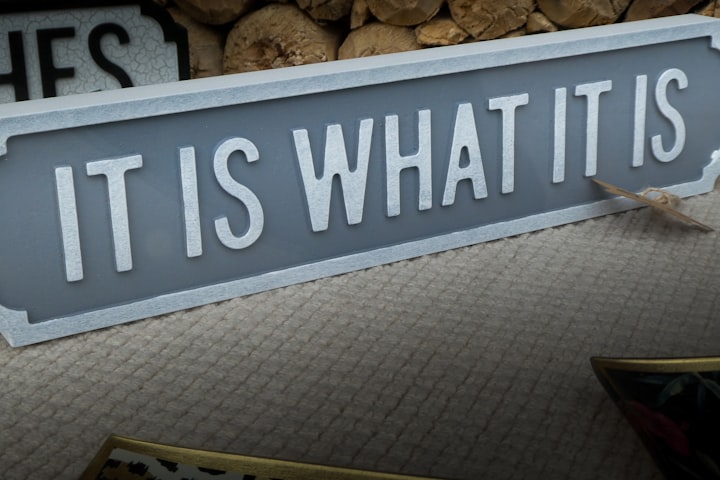Phrases That Make Me Crazy, Just Sayin'
"It is what it is" and "no problem"

To be a writer, you have to be creative and very imaginative. If you're creative and imaginative, then you're most likely self-motivated and driven to succeed. If you're driven to succeed, then you're possibly a risk-taker. You strive to think out of the box, and you're a bit unconventional. You're a good listener. You like researching your topics. You have a strong awareness, and you observe everything.
The above description could be part of my profile. If you're a writer, does it describe you too? If it does, then you possibly question the redundancy of phrases you hear.
One day, I heard the phrase, it is what it is, about a dozen times.
When I hear it is what it is, I always whisper to myself, "gag me." Every time I hear it, I tend to say to the person who said it, "I can't stand hearing that." And I usually follow it up with a short monologue about why people should use their imagination to create their own catchy phrase. It is what it is--the most overused phrase I've heard for years next to the one discussed below.
According to Dictionary.com,
Besides sports and politics, it is what it is has also seen exhaustive use in business, the military, and psychology. It's also titled songs and even a 2001 film. Throughout these contexts, it is what it is is used as a kind of verbal shrug signaling resigned acceptance of an unchangeable situation.
(Emphasis added.)
For some of the people who use that phrase, did they even attempt to look for a solution to the problem that brought them to the point of saying it? Is it early resignation before even trying to create a solution?
Six years ago, Inc. posted an article, The Stupidity of 'It is what it is….' Sometimes certain phrases creep into our vocabulary without our even noticing. This isn't always a good thing. Although it used another example associated with this phrase, the reasoning could be applied to other situations. The writer succinctly described what occurs when you use this phrase:
It abdicates responsibility, shuts down creative problem solving, and concedes defeat.
How many times do you say or hear no problem?
No problem is my second disliked overused phrase. I even had to research it to find out why it became so popular. It's another phrase that's crept into our vocabulary over the years and, without question gets repeated.
When you say "thank you" to someone, and you're accustomed to hearing "you're welcome" in return, maybe you didn't know how to respond or what to think the first time you heard, no problem. Were you aware this phrase can be interpreted in different ways?
According to SouthernLiving.com,
To some individuals, saying 'no problem' is the same as telling you they don't have any issue with this request, this one request, right now. But that says nothing of future requests, which implies there is an expectation that some forthcoming task will be problematic.
Millennials aren't the only people who have embraced this phrase. I hear older people routinely saying it. Many who use this phrase are genuine in their response. It's another way of their saying, "you're welcome." They just prefer to say a phrase that creates a little ambiguity or because it's some new phrase that someone else is using. Then I read the following and humorously have shared it with people who overuse it daily. I want them to question why they adopted the phrase.
According to UrbanDictionary.com, see below. This made me laugh out loud. No problem is:
A way of telling your boss, "F**k You'' without him knowing.
Boss: "Can you work Saturday?"
Employee: "Sure, no problem."
So, when I shared the above with former co-workers, it was food for thought. And thereafter, every time I heard someone at the office saying it, I always wondered about the sincerity when they said this phrase.
How many times have you heard someone saying it with a smile, and you knew it was a problem? When you hear someone saying "you're welcome" or "welcome," it just sounds more sincere and thoughtful, doesn't it? Maybe "welcome" is just a sign you hang outside your front door now.
Don't get me wrong; I understand it's probably similar to some people who used to say the phrases, "don't mention it" or "anytime," instead of saying "you're welcome." I would say 50% of the time, I hear "welcome" back, and the other 50%, it's usually, "no problem." I guess it is what it is.
© Cathy Coombs
Sources: Southern Living; Dictionary.com; Urban Dictionary; Inc.
About the Author
I retired early from my highly qualified status as a senior-level legal secretary. I earned a B.A. in English Journalism & Creative Writing. I am driven to read and write hours each day. I churn five decades of living experience into redefining perspectives and lifting positivity.
About the Creator
Cathy Coombs
Earning a B.A. in English Journalism & Creative Writing confirmed my love of literature. I believe every living experience is tied to language, and words influence us all.
Website. Write, self-publish, and self-market. Go.






Comments
There are no comments for this story
Be the first to respond and start the conversation.